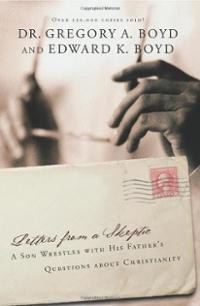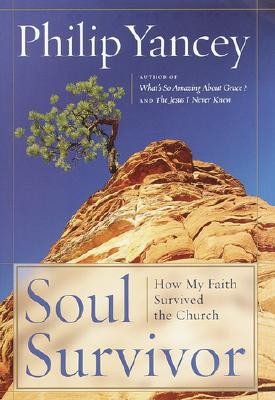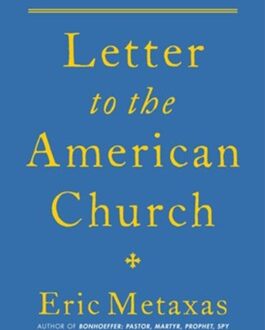Letters from a Skeptic
 What an encouraging, instructive, challenging book this is. Ruth read it before I did, and she described it this way:
What an encouraging, instructive, challenging book this is. Ruth read it before I did, and she described it this way:
As the title suggests, this is a series of letters between Greg Boyd and his father in which many questions about the plausibility of Christianity and the Bible are asked and answered. Boyd has a very simple, readable style, with an underpinning of complex philosophy and theology. I thoroughly enjoyed this and would recommend it to anyone who is interested in Christianity, either for someone examining it from outside or for a Christian looking for clearer understanding of its issues.
I didn’t realize till after I’d read The Myth of a Christian Nation that Letters from A Skeptic is by the same author. Since I always fit into that last category of Christians seeking more clarity, I picked it up on my Kindle. (Incidentally, it’s only $2.99 right now on the Kindle, so if you have any interest in it, now is a good time!)
I appreciated several things about it very much. First, it’s exhaustive, or close to it, in its range of questions. The book represents the results of an invitation by Boyd, a theology and apologetics professor, to his father, who is not a Christian: let’s have a dialogue in which you ask me all your questions about Christianity. And wow, does Mr. Boyd senior ever have questions! They run the gamut from the personal nature of God, to the resurrection, to the inspiration of scripture, to the textual integrity and historicity of the gospels, to the presence of the miraculous, to the existence of hell. (That’s just a sampling!) My only regret is that (though I just recommended purchasing it on the Kindle) I don’t have a hard copy to return to as a reference in the future. The questions and answers are excellent, some of them reminding me of familiar points, and many of them raising points I’d never thought of.
Second, the tone of the book is loving and very honest, and the rational discussion is always connected to Boyd’s ultimate hope for his father: salvation. There is no sense of a battle of minds, or intellectualism for the sake of intellectualism, or an attempt to manipulate someone into faith. Instead, the book is permeated with a sense of the weightiness of the matters discussed, as well as hope and urgency and respect. Boyd is not afraid to be open about his hope for his father, and he frequently returns to it: “The reason why I could never grow tired of dialoguing with you about the faith, Dad, is that I want so much to see you enter into this relationship and to share this new life.” It’s fabulous. It brought me to tears more than once.
Third, the book spoke to me personally about some struggles I’ve been having in my faith. I’ve posted here about them occasionally, and probably annoyed some readers; frankly I get impatient with myself about it all. But there is a warm reassurance I felt as I read this book, partly because there are answers to the questions I have as well as a long tradition of people asking them, and partly because they were addressed here within their context of relationship with God, and the eternal setting in which we live out our choices. (Boyd echoes C.S. Lewis when he talks about how we become our choices, and I was struck once again with the tremendous legacy Lewis has left us.)
I’ll probably be revisiting this book in a future post I’m thinking about. But in the meantime, I can’t recommend it highly enough as a rich theological compendium made coherent and meaningful by its steady context of loving pursuit. Incidentally, as all epistolary books do, this tells a story as well, one that won’t fail to move you. Highly recommended.



4 Comments
Amy @ Hope Is the Word
Sold!
Barbara H.
This wasn’t what I thought it would be just from the title. It sounds very good.
Pingback:
Sherry
OK, I just ordered it on my Kindle although I’ll probably also wish I had a hard copy. I would like to have a conversation like the one described with my sort of agnostic/vaguely spiritual adult son, but I don’t think he’d be interested. He’s got to want to seek before he can find.